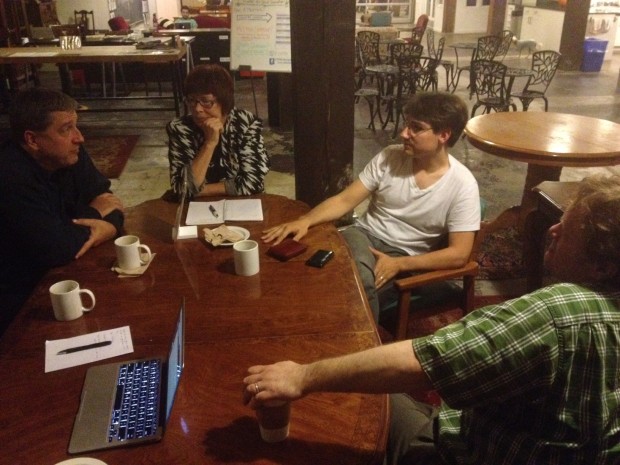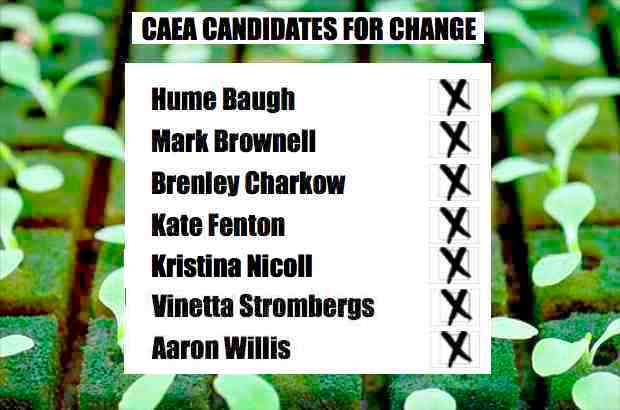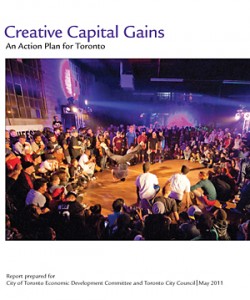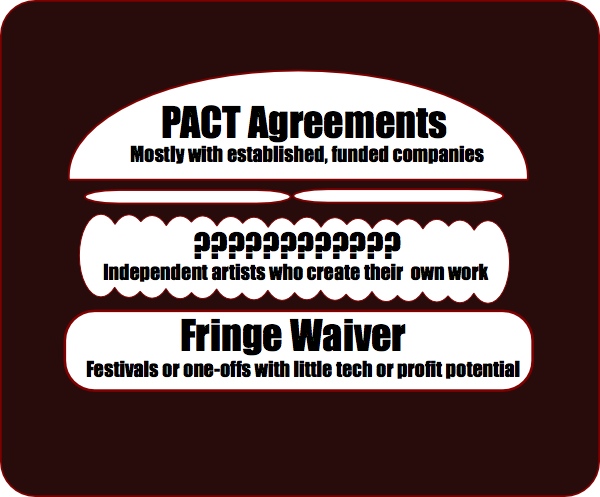Category: CAEA

Ontario Councillors Mark Brownell, Vinetta Strombergs, Aaron Willis and Hume Baugh talking Equity with Praxis in 2012
ONTARIO EQUITY MEMBERS: You are cordially invited to attend this year’s C.A.E.A. Ontario Regional General Meeting!
Where: Factory Theatre, 125 Bathurst Street, Toronto, Ontario
When: Monday, September 9th at 7 p.m.
This year’s agenda is packed with many important issues that directly affect you as a member.
1: A preliminary status report from the Executive Director on CTA Engagement Levels 1 & 2
2: A new dues referendum on the horizon
3: Panel Discussion – The Incredible Shrinking Rehearsal Period
A timely examination of best practices in rehearsal. Why are we putting up with less and less rehearsal time in English Canada? How can the situation be improved? What can our association do about it?
Make sure you present your current membership card at the door. Drinks to follow. Join us!

by Aislinn Rose
Voting in the CAEA Council elections ended last night and the results are in.
Huge congratulations to five of our seven endorsed candidates in Ontario who ran as a slate promoting indie issues, improved communication between staff, council and the membership, and a re-examination of the role Equity plays within the performing arts ecology in Canada.
Those new Councillors are:
ONTARIO

Hume Baugh

Mark Brownell

Kristina Nicoll

Vinetta Strombergs

Aaron Willis
Congratulations also goes out to the other two fine candidates elected to Council in Ontario: Nigel Bennett and Yanna McIntosh.
Here’s hoping that an Indie Advisory Committee is formed, allowing Brenley Charkow and Kate Fenton, our other two endorsed candidates to participate in a significant way. Jason Chesworth would also be an excellent addition to such a committee.
Full National CAEA election results can be found here.
Follow Aislinn on twitter: @AislinnTO

by Aislinn Rose
I recently had a conversation with four of the seven Ontario candidates we are endorsing in the current CAEA elections. Voting continues today until 5pm PT.
In attendance: Hume Baugh, Mark Brownell, Vinetta Strombergs and Aaron Willis
WHO ARE THESE PEOPLE?
AISLINN: To get the conversation started, could you go around the table and tell me who you are, what your relationship with Equity is?

Hume Baugh
HUME: I’ve been a member since 1984, so that’s something like 28 years. I’ve done lots of different things and have worked for larger companies, but I’ve also spent a fair bit of time over the years doing smaller indie theatre and have observed for years that it’s been difficult, next to impossible in many cases to do it without interference from Equity, which is always too bad.
What really got me interested in Council is what happened to me in December when I and three other people tried to produce one of my own plays and it was a nightmare of being forced by Equity to use a higher level of a contract than I could afford to do, and just feeling like there was no way to have any dialogue, and a staff member refusing to meet with me when we reached an impasse. I was outraged.
The issue of indie theatre and the issue of the kind of communication that’s happening with the association is really what got me interested in being on council.

Aaron Willis
AARON: I’ve been an Equity member for ten years. I got hooked into thinking about Equity Council similarly to Hume, when I was starting to create as an indie theatre producer and having similar difficulties and conversations. Basically being dictated to about what should or shouldn’t happen, and then having to sign agreements that didn’t reflect anything about the way that the work was being created.
Rather than running for Council I ran for the CPAG, the Council Policy Advisory Group, in the last term, and I was co-chair of that with Brenley Charkow. Sitting on the CPAG gave me a real picture of how Equity works from the inside. At the end of those three years, I thought this is a severely dysfunctional organization that doesn’t represent its members very well at all. I thought that means it’s actually time to run for council and try to do something about it.

Vinetta Stromberts
VINETTA: I’ve been a member of Equity since the dawn of time, since the beginning of the alternate theatres. I go back to the 70s. I’ve been on Council before Policy Governance, and I got involved with fighting Equity, because that’s what it’s been, since the late 80s with the original group trying to get the equivalent of festival waivers for Rhubarb.
It was those next wave of small theatres, which was the first wave since the original theatres in the 70s. They were fighting Equity to find a way to do mostly the play development festivals like Rhubarb. The Fringe was in there too, so there was a group of us, who basically did what we did this time around, to get the indie agreement negotiation started, we invaded an Annual General Meeting and we put a motion on the floor. After that negotiation started, every time we showed up at Equity to negotiate, there was a different group of people across the table, even different staff members.

Mark Brownell
MARK: I’ve been a member since 1988. I picked up from Vinetta with the Indie in the 90s with Naomi Campbell. The Council at that time had a lot more control over what was going on and I think there was more of an indie-friendly council back then because they recognized there was a problem. In fact, I think Equity has sort of been realizing there has been a problem that needed to be solved, but there’s always somebody there to sort of block it along the way.
I was the one who initiated the resolution that passed 96 – 1. It was basically a bunch of us who invaded the Annual General Meeting… which hadn’t received quorum the last two times, by the way, so they could pass two or three years of minutes. So they were actually pretty happy. They kind of thought, oh, maybe we should engage the indie on this, even though I don’t think they had any idea or intention to fix anything… they were just happy that people were interested. Of course, the people who are interested have pitchforks…
ON AGMS AND VOTES FOR CHANGE
MARK: At that time Equity was blind, deaf and dumb to anything indie. You go back to previous minutes of previous councils and they had no idea what was going on. It really hit them, it was a blind side…
HUME: About what?
MARK: About any kind of dissatisfaction within the indie. It’s been brewing for 20 years…
HUME: But there’s been so much fighting with indie artists…
MARK & VINETTA: But that’s not Council…
AARON: That’s one of the things that came up is this gulf between staff and council…
MARK: It’s huge…
AARON: I said this at the all-candidates meeting: Staff represents Equity, Council doesn’t. When the Indie Caucus started bringing this stuff up, councillors were saying “why didn’t anyone come to us?”. But nobody knows who you are, no one knows who council is, and when you call Equity you deal with a staff member. That’s who you talk to.

Talking Equity at the Annex CSI cafe
MARK: I have to mention at the Montreal AGM a couple of years ago, we put forward yet another thing that passed again. Zach Fraser was involved in that, and Sarah Stanley… it was basically a reaffirmation of my mine, and Walter Massey stood up, one of the original members of Equity, and I thought oh Christ, here it comes… and he stood up and said “we’ve been facing this problem for a long time and we need it to be fixed”…
AARON: wow…
MARK: One of the original members of Equity said that. And all the people who were against it couldn’t vote against it. They were ready to vote against it. We only had a quorum of about 50 people in Montreal, but suddenly all those councillors who were so dead set against it could not stand against this man who had actually created the union. I was shocked. It was a really wonderful night.
SURVEYS AND PATERNALISM
AISLINN: You mentioned being involved in the writing of the current indie policy and I want to talk about this notion of getting great people working in a room together on what a new agreement should look like, and then this history of these draft agreements moving behind closed doors and what comes out is very different to what went in. Do you see that happening again?
VINETTA: I don’t have a lot of faith in how they are portraying the results of the survey. If you say to people, “Hume, would you rather work for Equity minimum, or work for less?” Duh. Of course, we know what the answer is. However, if you have an opportunity to work on a project you believe in, are you willing to work for less? Yes. But they will skew that result and say, “oh, 98% of the people said they want to work for minimum… and only 78% said they were willing to work for less”.
The point is, nobody says you HAVE to work for less, but they say you CANNOT. So they are preventing people from working, which I believe is unconstitutional. And I’m not talking Equity Constitution. They’re preventing us from doing the work we want to do. And the work that charges us, that makes us better, that fulfills us.
AISLINN: There’s been a lot said about the survey and the poor questions that were asked, because obviously the preference is to work for minimum fees. But I feel there were some very clear results that came out of the survey in terms of what many artists value more than minimums, like the opportunity to work with certain artists, creating stuff that’s their own.
MARK: Aislinn, that is where your document comes in very very handy. Because we now have a benchmark. When the new Indie and Co-Op comes out we can compare the two and say here’s where it meets and here’s where it doesn’t meet the survey results.
AARON: This thing about taking stuff behind closed doors, the first I’d heard publicly at all that there was going to be a new Co-Op and a new Indie was when Kerry Ann mentioned it on Facebook.
Kris Joseph did this great job leading the Independent Theatre Review Committee and now he’s saying “I’ve seen a draft of the agreement Arden is working on”. So Arden’s doing it herself.
I think it comes down to contempt for artists, saying “we know better than you”…
VINETTA: … you mean “hobbyists”…
MARK: There’s a paternalism.
AARON: “We know better than you about how you should do your business and how you should create your art. We’re here to protect you from yourselves.” And I find that deeply insulting. There are so many artists who are entrepreneurial and we need an association that supports that and doesn’t squelch it.
MEMBERS WHO LIE
AISLINN: In the survey there was a number, something around 25% of the respondents, admitted to having lied to Equity about work they had done…
MARK: That’s low… that’s a low figure…
HUME: The lying isn’t new though… it might just be increasing…
MARK: We had a wonderful AGM at Passe Muraille as part of the CPAG a couple of years ago. We didn’t really intend it, but we suddenly had a whole panel that stood up and said “I lie, I lie. You’re telling me I have to do it this way and I can’t afford it so I lie”. And suddenly people in the audience started standing up and saying “I lie too”. At that point I was shaking my head and asking, at what point are these agreements totally pointless? If people are lying, if they’re having to bend the rules every time… and it’s not just members, it’s Equity itself shuffling all these productions into the Co-Op.
AARON: Equity would like to be the gateway to professionalism. You get your Equity card and that means you’re a professional artist. But that’s not true. There are lots of people who create stuff and make a living and who aren’t Equity and don’t need to be.

Hume talking indie theatre
HUME: You also have these individual artists who decide they want to get together to do a project. Maybe one of them got an OAC grant, so now all of a sudden this person has to become an engager. Equity is constantly pitting its membership against each other.
The whole first 20 years of my career we’ve kind of accepted that this is way Equity is and you just have to fight or lie, but in December it was absolutely insane that when I was producing a show the only organization I had trouble with was my own association, that’s crazy to me. I pay my dues, and I spend this whole time being treated like a criminal, or a shifty kind of person.
MARK: I belong to four associations. Equity is the only one I don’t feel has my back.
WHAT THE HELL IS POLICY GOVERNANCE?
AISLINN: You were saying before that there’s a disconnect between members, council and staff, that council is out of the loop. As four of the seven looking to fill the seats in Ontario, if you get elected, what do you want to do to change that?
MARK: Policy Governance is the biggest barrier between Council & membership.
AISLINN: Can I stop you there, because I wonder how many members know what the hell that is?
AARON: Essentially, Council cannot tell staff what is good or not good about an agreement. If some of us get on Council, people who have worked in this way and have useful things to say about what is good or useful in an agreement… all we can do is write policy that Arden will interpret to fix the thing she’s writing.
There’s this idea in Policy Governance, that Council only looks at the Big Picture, not at the details. And then Council has to speak in one voice and present a united front, as opposed to advocating for specific things that need to happen.
What I would like to do once this new indie agreement comes out, if issues come up, I will say “I think there are things that need to be changed”, even though, technically under policy governance I’m not supposed to do that.
MARK: That’s how we can represent the membership.
HUME: I can’t imagine if I was elected, thinking about doing anything else. How would you be able to sit there is somebody brought forward something you disagree with and not say “I disagree”?

Mark, Vinetta & Aaron
MARK: When the door is closed and you’re in Council, you speak your mind. The moment there is a decision made by Council, all Council is supposedly in agreement.
VINETTA: I’ve been asking around in the community and various organizations to get a sense of what others think of Policy Governance and they say it’s for the corporate world, and it doesn’t even necessarily work there.
AARON: It prevents the people who are elected from actually communicating with the membership.
Jason Chesworth [one of the other Ontario candidates] wrote a great piece on facebook about all the things he would do as outreach to membership, and under Policy Governance, he wouldn’t be able to do any of those things.
MARK: One of my biggest interests is advocacy, but under Policy Governance I can’t do it. I can only put it into policy to make Arden/staff do it. But Advocacy should be a core value.
WHAT EQUITY COULD BE
AARON: As an organization that is not a union, but something that represents a bunch of self-employed contractors, what Equity’s role could be in helping the ecology of theatre grow is finding ways to not just defend us as workers, but to also advocate, defend and encourage us as entrepreneurs.
A trade association is a bunch of members working together to grow and prosper, and Equity could be leading that.
MARK: It all comes down to pride in membership. Equity should be bending over backwards so that members finally say, “I’m proud to be an Equity member”. Currently that’s not the case. That is Equity’s main challenge.
Follow Aislinn on Twitter: @AislinnTO

by Aislinn Rose
This is a continuation from Tuesday’s post about what the new Indie Policy should look like, and how that policy would reflect the will of Equity members. Today I’m arguing why the Co-Op Policy should be put out of its misery, based on the same final report I referred to on Tuesday, created by Equity’s Independent Theatre Review Committee.
Traditionally, the Equity Co-Op Policy has been used for collectives made up of members to create their own work. All members of the collective are assumed to be carrying equal weight and responsibility, and therefore any split of the box office is divided equally among participants.
So why put an end to the Co-Op?
Simply put: it’s irrelevant and unnecessary.
As I wrote in Tuesday’s post, the ITRC Final Report revealed that the Festival Policy was the most popular policy among members, engagers, AND staff. While more than half of the members and engagers expressed some level of satisfaction with the Co-Op Policy, the level of satisfaction is much lower than for the Festival Policy, particularly among members. Stated issues included:
- Difficult application process
- Three production limit rule
- Quotas of member vs. non-member participants
- Co-Op roles & responsibilities being rarely equal for equal shares
The “three production limit” means that collectives who’ve gained acclaim and reputation for their work under one name are forced to either change their name or use another agreement they (likely) cannot afford when it’s time for a fourth production. Another complaint is that collectives who have “graduated” to another agreement like The Indie, were not allowed to then move “back down the ladder” to the Co-Op. It is a policy that assumes a theatre company that has money once will have it in perpetuity, or it should die.

Convergence Theatre's Yichud
These kinds of restrictions have resulted in some companies having to invent new identities for themselves, while others have fought those restrictions in order produce under the name for which they are known. After all, Convergence Theatre does not get to be called “The Best Site Specific Theatre Company in Toronto” by NOW Magazine if they don’t get to be called “Convergence Theatre”.
According to the survey, some members see the Co-Op Policy as outdated and needlessly complicated, and that it doesn’t reflect the way theatre is now made. The final report also indicated that Equity Staff themselves find the Co-Op Policy labour-intensive, and agree that Co-Op projects are not often true collectives.
SummerWorks 2012 provides two examples of different creation and company models: Terminus, produced by Outside the March, a pre-existing successful company in Toronto, and Iceland, produced by The Iceland Collective, which was created for the purpose of putting on that show. They were two very different projects, created by two very different company models, one with an existing text and one with a new text, both of which used the very simple Festival Policy to produce their work and engage CAEA members. Both productions have been picked up by established companies for FULL EQUITY remounts in the 2012/2013 Mirvish and Factory seasons.
This is the beauty of the festival policy, as well as the new Indie Policy I am recommending. Rather than having a document that demands you fit into a certain mold or model, you have a document that asks who you are, how you’ll make your work, and whether all the members have signed off on that agreement. It fits to your model, not the other way around.

Rebecca Northan: Not a hobbyist
For those who think Equity should stay out of small-scale theatre entirely, I would argue that a signed contract with agreed-upon terms assures that everyone around the table, everyone working in the room, acknowledges that work as a professional pursuit, whatever the reasons of the individual participant, and ensures that members are protected while engaging in that pursuit.
Any new agreement about to be revealed by Equity staff that continues to include minimum fees, does not not allow members to determine payment & working conditions amongst themselves, or persists in administering the outdated and irrelevant “Co-Op”, is a proposal that does not reflect the will of the membership, and instead reflects the will of an organization saying “we know best”.
What say you?
Follow Aislinn on twitter: @AislinnTO

by Aislinn Rose
Last week I wrote about the CAEA elections and introduced you to the seven Ontario candidates running as a slate with three main areas of concern:
- A new Indie Agreement that reflects the will of the membership
- Drastically improved communication between staff, council and the membership
- A re-examination of the role Equity plays within the performing arts ecology
This week I want to focus on the first item of their collective agenda:
A new Indie Agreement that reflects the will of the membership.
This is an important distinction to make: an agreement “that reflects the will of the membership”. For years now, Equity and a good number of its members have been at odds when it came to how independent theatre ought to be made in this country. These two articles offer quite a bit of history on this issue, including the votes by members to demand a new agreement, and the creation of the Independent Theatre Review Committee.
The ITRC conducted a nation-wide survey of Equity members, which resulted in an excellent final report, summarizing the responses from artists and engagers alike, and offering several key recommendations. When it comes to “the will of the membership”, that information is readily available, and I applaud the ITRC for their efforts in compiling the data.
Below I offer you my own recommendations of what the new Indie policy should look like, and exactly how that policy addresses all of the major recommendations put forward by the ITRC. I have also used the information in that report to argue for the death of the Co-Op agreement. These are my personal views based on my understanding of the final report and my work as an independent theatre producer working with many Equity members and several staff members over the past few years.
This is what the new Indie should look like:
1) The new Festival Policy should be put forward as the new small-scale theatre contract. You can see the current festival policy at the bottom of the post.
I recommend not calling it an agreement, as there is currently no bargaining organization that exists in the way that PACT bargains on behalf of its companies for the CTA.

Click to enlarge
2) An “agreed upon terms” document, similar to the one included in the Tangerine Project, should be included as an addendum, allowing artists to bargain on a per-project basis, key terms including project ownership, first right of refusal, etc. An additional section could be added regarding agreed-upon fees, where artists & engagers opt for either a share of profits, or a set minimum fee, as determined by the group. Again, this would be on a project-by-project basis.
Let me be clear: the only role Equity would play in the creation of this document would be to ensure it has been filled out and that all participating members have signed off. At that point, it goes into a file.
3) Finally, a jury of peers (mostly members, with some non-member engagers) should be created (perhaps via the new CAEA Indie Advisory Committee) to assess contracts that may bleed into the harder to determine engager category.
There were some contradictions within the survey results regarding which engagers should be allowed to use the new Indie, based on project budget, and or a company’s core funding. Such a committee of peers could assess these situations should they arise. It is essential that the committee be made up of peers as those peers are actively working in the community and have the best sense of who these companies are and what their resources might be.
Notes on how this policy addresses the ITRC’s Overall Conclusions and Major Recommendations:
ITRC Conclusion #1: The survey revealed that of the small-scale agreements, only the Festival Policy is well liked by members, engagers and staff. That is telling. The main recommendation in this section was that the current agreements should be replaced with a new agreement(s). It is my assertion that this version of the Indie could replace all of these agreements, providing artists and engagers with a high level of flexibility allowing for a variety of creation methods and company models.
ITRC Conclusion #2: Members and engagers highly value small-scale theatre, and this view is also supported by comments from staff. This version of the Indie would confirm and validate the importance of this work, by recognizing the financial challenges that companies & collectives inevitably encounter. It would confirm that Equity does not consider artists who engage themselves in this kind of work as “hobbyists”.
ITRC Conclusion #3: The majority of dissatisfaction appears to stem from concerns about lack of flexibility, administrative red tape, and adversarial relationships with staff. Many members feel the need to lie to CAEA or do their work in the shadows. Staff are concerned with the amount of work required to administer the current agreements. This one seems obvious. The Festival Policy is the most popular agreement among both artists and staff. It offers an incredible amount of flexibility and essentially only requires filing on behalf of Equity staff. The addition of the Agreed-Upon Terms ensures a more professional level of engagement in that the terms are created while working toward a future for that individual project. This kind of agreement would likely improve satisfaction levels with Equity’s role in small-scale theatre, which is currently quite low.
ITRC Conclusion #4: Members & engagers agree artists should have safe working conditions, and an adherence to Equity’s standards of professional conduct. The protections members were most willing to waive included the quotas of Equity vs. non-Equity members, how artists are paid (cheque, money order, etc.), and pay for for a full work week regardless of the level of particupation. The use of the Festival Policy and Agreed-Upon Terms offers the security of safe working conditions by ensuring that artists are insured while working. While insurance costs may be somewhat burdensome for companies and co-ops, I believe those costs are minor in comparison to alternatives offered in current agreements, and really, who doesn’t like to be insured?
The Agreed-Upon Terms document then allows the collective of artists/engagers to decide amongst themselves how artists will be paid, the periods of engagement, etc.
According to the survey, members and engagers were very much in line with one another regarding which protections & benefits were most important, and which were less important, which indicates that members & engagers are capable of coming to agreed upon terms amongst themselves.

Are you a CAEA member? Have you voted yet?
ITRC Conclusion #5: Members & engagers value flexible terms of engagement in small-scale theatre work. While members value compensation for their work, the survey indicated a strong willingness to take part in projects where fees are paid as profit-shares, or percentage of gross revenue. Members & engagers were in STRONG AGREEMENT that profit-sharing models are acceptable in lieu of minimum fees, including equal splits or profit-sharing where participants receive multiple shares for multiple jobs on a project.
As I’ve suggested above, compensation should be spelled out very clearly within the Agreed-Upon Terms addendum in order to address options of equal splits, profit share, and/or multiple shares for multiple roles. Again, this allows members and engagers to determine these factors amongst themselves without Equity interference.
ITRC Conclusion #6: Most respondents were in agreement that non-profits and ad-hoc groups should have access to the new Indie. While I think the vast majority of companies and ad-hocs wishing to use the new indie would be clear-cut in terms of their eligibility, the CAEA Indie Advisory Committee (as mentioned above) could be of assistance in determining eligibility with projects in the grey zone: projects with budgets over $50K, as were noted in the survey.
Members & engagers regarding both also felt there shouldn’t be any restrictions based on past productions or other agreements used, and that the engager can be a member or a non-member. This is significant considering most current small-scale agreements include restrictions on the number of times a company can use them, or include a “ladder” system wherein a company that has used one agreement can no longer access another, etc.
Final Note:
The process should not be seen as an “application” for permission to Equity. Members and engagers need only follow the guidelines set out in the Policy, including their own agreed-upon terms, submit the required paperwork to Equity, and then get on to the task of making theatre.
In turn, Equity staff would receive the paperwork, ensure it has been sign-off by all members involved, receive the appropriate payments for insurance, and file the paperwork accordingly, allowing artists to get on to the task of making theatre.
Stay tuned for the conclusion to this post later this week: Why the Equity Co-Op should just die
Follow Aislinn on twitter: @AislinnTO
Festival Policy

by Aislinn Rose
*Updated Tuesday, October 9th: Kristina Nicoll has been added to the indie slate, rounding off the number of candidates to 7, the same number of seats available in the Ontario region.*
Last Monday, CAEA Ontario held an all-candidates night to introduce the 20 local candidates running to fill 7 Ontario seats. Each candidate was given an opportunity to read their prepared statement and then take questions from the audience.
From those statements, 6 candidates have emerged as a clear slate of member/creators with three main priorities should they be elected:
- A new Indie Agreement that reflects the will of the membership
- Drastically improved communication between staff, council and the membership
- A Re-examination of the role Equity plays within the performing arts ecology
We would like to introduce you to the slate of candidates whose collective platform we are endorsing:
Hume Baugh
Mark Brownell
Brenley Charkow
Kate Fenton
Kristina Nicoll – added October 9th
Vinetta Strombergs
Aaron Willis
You can read their entire collective statement at the bottom of this post.
As Co-Chair of the TAPA Indie Caucus, and Artistic Producer of Praxis Theatre, I’m sure it will come as no surprise to our regular readers that I am weighing on this election, and endorsing an indie slate with these collective intentions. We have written extensively about Equity’s long and drawn-out process to create a new Indie Agreement, and my Praxis colleague Michael Wheeler has endorsed Equity Councillor and CPAG candidates in previous years.
As with all elections, it’s important to make an informed decision. Over the next couple of weeks, I’ll be writing more about the Indie Agreement and what I think it means to “reflect the will of the membership”. We’ll also tackle Equity’s perceived mission & mandate in comparison to the very first clause of CAEA’s constitution demanding that the Association:
“support the general welfare and advancement of the performing arts not limited to but focusing more particularly on the theatrical performing arts and those engaged in theatrical production”
As always, we welcome debate from all sides in our comments section. If there is a particular issue that you would like to see addressed, let us know, and if we can’t address it ourselves we’ll do our best to find someone who can. If you’re a member, you should also check out the already lively debates on the Ontario & National CAEA Facebook pages.
Voting started on Friday, and continues until Wednesday, October 31st. Members should have received their voter instruction kits by now, and I encourage everyone to read the statements of all Ontario candidates here. If you are voting outside of Ontario, you can find your candidates by region here. If you haven’t received your voter kit by October 10th, Equity is encouraging members to contact the national office for assistance.
You can vote online or by phone, and you have the rest of the month to do it. So if you haven’t already voted, check out the indie slate’s platform below, and then join the discussion.
Follow Aislinn on twitter for updates: @AislinnTO
Indie CAEA Nominees Collective Platform
Ontario All Candidates Meeting:
Monday, October 1st – 7 p.m. – 10 p.m.
The Tapestry/Nightwood Ernest Balmer Studio
9 Trinity Street – The Cannery (Distillery), Studio 315, Toronto, Ontario
 From CAEA:
From CAEA:
“There are a record number of amazing candidates who are running in Ontario this time around. Please come out to support your fellow member candidates and hear their positions on the many many important issues facing our association.
Be sure to have your current membership card available!
Not to be missed.”
A response to “An open letter to the newer generations of Toronto theatre artists from one of the old farts”
Dear Old Farts,
You are absolutely right: “The issue is far larger than the firing of one AD”.
This is perhaps why you don’t see as many young members of our arts community getting up in arms about the firing of one AD as you might like. It’s not because we’re apathetic, it’s because we’re busy fighting those bigger issues and making art.
We’re opposing our governments at all levels. There are those who wish to corporatize the arts, and those who wish to politicize them, either by cutting funding or by moving resources away from arms-length funding bodies and into community events and festivals where the risk of political or dissenting art is low. And, in some cases, not allowed.
 We’re engaging in municipal processes that are supposed to be about creating new culture plans for our city, to determine cultural priorities, how money should be invested, how best to build and maintain a cultural ecology. We wrote about those consultations extensively here on praxistheatre.com. While I tweeted live from many of them, I was surrounded by young, active, vocal members of our community. Though I must say, it is rather dispiriting to realize you’ve been invited to contribute to a document that was written before you arrived.
We’re engaging in municipal processes that are supposed to be about creating new culture plans for our city, to determine cultural priorities, how money should be invested, how best to build and maintain a cultural ecology. We wrote about those consultations extensively here on praxistheatre.com. While I tweeted live from many of them, I was surrounded by young, active, vocal members of our community. Though I must say, it is rather dispiriting to realize you’ve been invited to contribute to a document that was written before you arrived.
Throughout those rooms the voices present asked that the city talk about art not just in terms of financial investment and return, but about the less tangible contributions that a healthy cultural community can offer a vibrant city. You’ll not see any of those voices included in the new culture plan. When it became clear that any voices in opposition to “creative class theory” would not be included in the report, I asked that my name be removed from the “Consultation Participant List”. I was not consulted, and nor were many of the people in those rooms.
We’ve been speaking up about our own professional association that was built based on old models of making work that no longer reflect today’s realities. Young artists often find the Canadian Actors’ Equity Association to be one of the biggest roadblocks to the development of their work, another issue we’ve written about extensively. You’ll find no apathy on this topic. Younger artists have been working together for years to bring change to this important but out-dated organization, and that work is hopefully about to pay off, despite the fact that some of the old farts have been vocally opposed to reforms that would empower the younger generation of theatre-makers.
The Toronto Indie Caucus is made up of “emerging” and “submerging” artists alike and populated by some of the most driven and passionate young people in this community, and it continues to grow. The work of these artists has contributed to some highly significant votes for change within the association, the development of an Independent Theatre Review Committee, and a possible new indie agreement on the horizon. Let’s hope these extensive consultations to which we have lent our voices will actually take those voices to heart.
We have also spoken out about Luminato, our most recently created arts festival. It was not created by a collective of artists, but by two Toronto businessmen who used their connections with the government to get millions of dollars in funding to create an arts festival as a way of luring tourist dollars back to the city after the SARS crisis. They wonder why, after 6 years they’re failing to find a dedicated audience, community support or “brand awareness”, though I don’t suppose I need to remind our readership that their most recent season included no Toronto theatre artists in its lineup.
And finally, we’re fighting those very structural models upon which the Factory Theatre, and companies like it, is based. For years, arts organizations have been forced to fit into a certain mold in order to appease the various funding bodies. So we’ve incorporated, we’ve set ourselves up as not-for-profits, we’ve created our boards of directors, and we’ve gone after charitable status. This worked for a number of years while there was enough money to go around, but that’s no longer the case.
So we’re researching, we’re investigating best practices in other cities, and some of us are working with Arts Action Research in a program called Theatres Leading Change, which is all about discovering new models that are best for the work that we create, and the way we go about creating it.
When we’re asked to consult, we show up. When there are debates and votes happening at City Hall, we’re there too. When Equity tries to bully us, we get together and push for reforms. When our institutional leadership fails us, we speak out. Also, when elections happen, many of us work our arses off canvassing, letter writing, phone calling, and video-making.
This is not apathy, but a quiet community of passionate and dedicated artists working away at changing what no longer works. I am not silent, I sit on no fence, and I am not complicit. I’m just offering my voice to a different fight.
In “The Empty Spaces, Or, How Theater Failed America”, Mike Daisey had this to say:
“I’ve gone drinking with the artistic directors of the biggest theaters in the country and listened to them explain that they know the system is broken and they feel trapped within it, beholden to board members they’ve made devil’s deals with, shackled to the ship as it goes down. I’ve heard their laughter, heard them call each other dinosaurs, heard them give thanks that they’ll be retired in 10 years.”
So yes, you’re right, this issue is larger than one AD, and those bigger issues are the ones we’re trying to tackle.
Yours in action,
Aislinn Rose

Where's the beef? * Fringe Waiver has been replaced by the Festival Agreement.
by Michael Wheeler
 CAEA is about to change how it interacts with indie and self-producing artists in Canada.
CAEA is about to change how it interacts with indie and self-producing artists in Canada.
Before this goes down, CAEA Executive Director Arden Ryshpan is engaged in a cross-country tour to get feedback on what this new agreement should look like.
The snarky part of me wants to cite the numerous concrete suggestions and even a model contract that has undergone extensive public consultation ALREADY, forming the basis for not one, or two, but three overwhelming votes by membership at AGMs to reform the way indie theatre is contracted, as well as the great work done by the Independent Theatre Review Committee. But let’s let bygones be bygones. If moving forward to the agreement membership wants means pretending none of this happened and now is the time to make suggestions, so be it.
Any Equity member in good standing who makes theatre in or around Toronto and has thoughts on this will be able to speak to Arden directly on Sunday May 6th at Buddies in Bad Times Theatre. Doors at 6:00pm, meeting begins at 6:30 sharp. Light refreshments will be served. Bring your Equity card.
If you are a CAEA member and don’t want to complain for another decade about a confusing array of prejudicial contracts that make it impossible to create your own work, please organize your schedules accordingly. Last chance to make an impact. Your voice is required (again).
Don’t live in Toronto? Here are the other tour dates:
VANCOUVER, BC
Date: Monday, May 7, Time: 7:00 p.m. – 9:00 p.m. (PT)
Doors open: 6:30 p.m. (PT)
Location: Revue Stage on Granville Island – 1601 Johnston Street, Vancouver, BC
CALGARY, AB
Date: Sunday, May 13, Time: 6:00 p.m. – 8:00 p.m. CT
Doors open: 5:30 p.m. CT
Location: Lunchbox Theatre – 160 115 9 Avenue SE, Calgary, AB
Special instructions:
Additional Information: Socializing at the Auburn Saloon will follow the meeting
EDMONTON, AB
Date: Monday, May 14, Time: 4:00 – 6:00 p.m. CST
Location: Second Playing Space at the Timms Centre for the Arts (University of Alberta campus in Strathcona).
WINNIPEG, MB
Date: Sunday, May 27, Time: TBA
Location: Prairie Theatre Exchange (Unit Y300 (3rd floor) – 393 Portage Avenue, Portage Place, Winnipeg, MB
SASKATOON, SK
Date: Monday, May 28, Time: 6:30 – 8:30 p.m. CST
Doors open: 6:15 p.m. CST
Location: The Refinery Arts & Spirit Centre – 609 Dufferin Ave., Saskatoon, SK
MONTREAL, QC
Date: Sunday, June 3, Time: TBA
Location: TBA
OTTAWA, ON
Date: Monday, June 4, Time: TBA
Location: TBA
HALIFAX, NS
Date: Sunday, June 10
Time: TBA
Location: TBA

Last night, the Canadian Actors’ Equity Association held it’s Annual General Meeting. At that meeting, a Member’s Resolution was put forward by director, playwright and independent theatre artist Ed Roy:
WHEREAS Equity Member/Creators have demanded action on indie theatre issues for the last three years, expressed in the form of member resolutions at previous National AGMs, which resolutions passed 96-1 in February 2009, and 42-4 in October 2009;
AND WHEREAS the Independent Theatre Review Committee (ITRC) was formed in response to the demand for action on indie theatre issues and completed its work in September 2011;
AND WHEREAS the suggested policy changes resulting from the ITRC’s work on indie theatre issues have been debated and will soon be put in place by Council;
BE IT RESOLVED that Council require the Executive Director to deliver a plan that will directly address indie issues to CAEA members that will finally address indie theatre issues no later than October 31, 2012.
BE IT FURTHER RESOLVED that should the Executive Director fail to deliver a new indie plan to CAEA members by October 31 2012, then until such time as this new indie plan is delivered, that Council enact policy to enable members to work under any currently existing CAEA agreement, policy or guideline (with the exception of engagements governed by a negotiated agreement) as such individual member deems appropriate including the Festival Policy, the Guest Artist Policy, the “Indie” Policy, the Small Scale Theatre Addendum or Co-op Guidelines, without CAEA staff approval and without CAEA penalty or repercussion.
The motion was voted on, with more than two thirds of those in attendance voting in favour.
We have written previously on the issues of Equity and the work of indie theatre artists here and here, and very much look forward to seeing a new indie agreement that reflects the results of the Independent Theatre Review Committee survey, which can be viewed here.
Both the ITRC and Council have devoted a great deal of time and energy to this initiative. It is now in the hands of the Executive Director to deliver new agreements by the October 31st deadline. After four years of members bringing this issue forward and making it a priority, this is a very positive step for Equity.




















Recent Comments